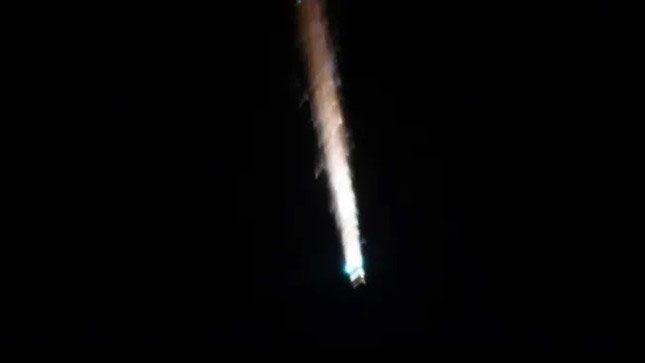A Russian cargo ship did not dock at the International Space Station (ISS), but instead blazed brightly in Earth’s atmosphere for hours as part of the waste disposal process.
Astronauts outside the ISS had the rare opportunity to witness a “fireworks display” in the atmosphere when the Russian cargo ship Progress MS-23 burned up upon re-entry into Earth’s atmosphere.

The Russian cargo ship MS-23 burning in Earth’s atmosphere on November 29, 2023. (Photo: NASA/Jasmin Moghbeli).
Roscosmos astronaut Oleg Kononenko told Russian media that the Progress MS-23 cargo ship had left the ISS carrying items that were no longer needed in orbit. Specifically, this cargo ship was loaded with outdated equipment, household waste, and everything that experts decided to discard.
Just a few hours after the Progress MS-23 failed to dock at the ISS, NASA astronaut Jasmin Moghbeli was able to locate the cargo ship and capture a stunning image of it burning in Earth’s atmosphere – a remarkable photograph taken from outside the ISS.
Sharing on X, astronaut Moghbeli wrote: “The event happened very quickly and could only be seen for about 2-3 minutes. It felt like witnessing a fireworks display, especially when it disintegrated. Thanks to ground guidance, I was able to see it.”
According to reports from the Russian space agency Roscosmos, most of this spacecraft and its contents were incinerated in Earth’s atmosphere, but some materials fell into the Pacific Ocean.
Such fiery returns are standard procedure for non-reusable cargo ships departing from the ISS. Two of the three spacecraft currently used for cargo transport, Russia’s Progress and Northrop Grumman’s Cygnus, are regularly disposed of in the atmosphere after they have delivered their cargo and need to make room for new supplies.
However, the third spacecraft currently used for these cargo missions, the SpaceX Dragon, can safely return to Earth and be reused in the future.
Another Progress spacecraft was launched from the Baikonur Cosmodrome in Kazakhstan on December 1, carrying three tons of food, fuel, and other supplies for the astronauts currently on the space station as part of Expedition 70. This spacecraft is scheduled to dock at the ISS on December 3.




















































